Page 341
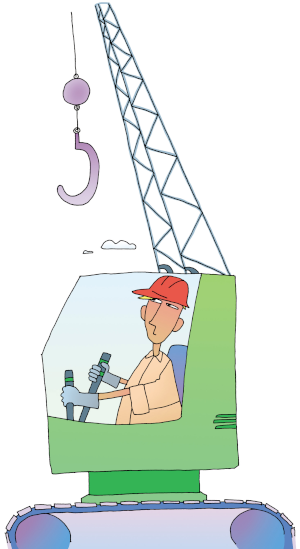
Building Vocabulary Skills
How do you build a mansion? Board by board, brick by brick, one bolt at a time. You can’t do it in a single day, but over time bricks become walls, and joists hold up floors, and you end up with a grand home.
You build your vocabulary the same way. If you spend just one day on it, you’ll be living in a little shack of thought. But if you go word by word, adding a little each day, you’ll end up in a mental mansion. This chapter will show you how.
What’s Ahead
WE 342
Page 342
Strategies for Building Your Vocabulary
1. Read and check.
When you are reading and you come to a word you don’t know, check the surrounding words (the context) to help figure out its meaning. Here are some ways to do this:
- Study the sentence containing the word, as well as the sentences that come before and after it.
- Search for synonyms (words with the same meaning).
Because I plan to be an actor, Dad calls me a thespian. (A thespian is an “actor.”)
- Search for antonyms (words with the opposite meaning).
Dad says fishing is tedious, but I think it’s exciting.(Tedious means “boring,” the opposite of “exciting.”)
- Search for a definition of the word.
We saw yuccas, common desert plants, on our drive to the Grand Canyon. (Yuccas are “common desert plants.”)
- Search for familiar words in a series with the new word.
In the South, many houses have a veranda, porch, or patio.(A veranda is a large, open porch.)
- Watch for words that have multiple meanings.
He charged me a dollar for the candy bar. My mom charged the battery on my go-cart.
- Watch for idioms (words that have different uses from their dictionary meanings).
“I’m cutting out.” (This phrase is an idiom that means “leaving a place.”)
- Watch for figurative language like similes and metaphors. (See pages 101–104.)
WE 343
Page 343
2. Use a dictionary.
You can always use a dictionary to find the meaning of new words. A dictionary can also help you with the following:
Spelling 🟪 If you don’t know how to spell a word, try looking it up by how it sounds.
Capital Letters 🟪 A dictionary shows if a word needs to be capitalized.
Syllable Division 🟪 A dictionary shows where you can divide a word. Heavy black dots (•) divide a word into syllables. A hyphen (-) shows that the word is hyphenated.
Accent Marks 🟪 An accent mark (´) shows which syllable should be stressed when you say a word.
Pronunciation 🟪 To remember a word and its meaning, it helps if you know how to say it. A dictionary spells each word phonetically (as it sounds).
Parts of Speech 🟪 A dictionary tells what part of speech (noun, verb, etc.) a word is. Some words can be used in more than one way.
Word History 🟪 Some words have stories about where they came from or how their meanings have changed through the years. This information appears inside brackets [ ].
Synonyms and Antonyms 🟪 Synonyms (words that have the same or similar meaning) are listed, and some words are used in sample sentences. Antonyms (words with opposite meanings) may be listed last.
Meaning 🟪 Some words have only one meaning, while other words have several meanings. You will have to choose the best one.
Tip Also use digital dictionaries and thesauruses. They come built into the program you use to write. And you can copy a word, paste it into your search engine, and type “definition” after it. You’ll see online dictionary definitions. Some even provide all of the functionality shown above.
WE 344
Page 344

WE 345
Page 345
3. Use a thesaurus.
A thesaurus is a book of words and their synonyms (other words that mean the same thing). A thesaurus also lists antonyms (words that have the opposite meaning). You can use a thesaurus to build your vocabulary and improve your writing. Use a print or digital thesaurus when you know one word but want other options to express an idea.
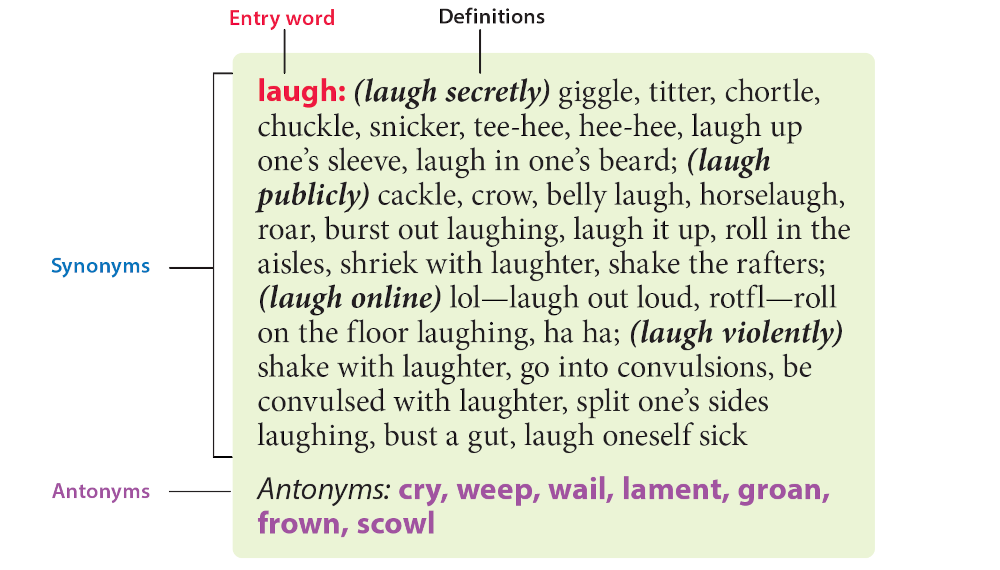
Choose a Word:
In some thesauruses, the words may be listed alphabetically, like in a dictionary; in other thesauruses, you may need to look up your word in the index. The sample thesaurus above was used to help a student find different ways to express his laughter in a blog post.
Comedy Sportz was so funny last night. At first, we were just snickering, but soon, we were shrieking with laughter and shaking the rafters! My dad roared like a bear. I never knew there were so many ways to laugh.
WE 346
Page 346
4. Keep a personal dictionary.
You can improve your vocabulary by keeping a personal dictionary and adding new words as you read or hear them.
- Look up each new word in a regular dictionary to learn what it means and how to say it.
- Write the word and its part of speech on a note card, in a notebook, or in a computer file.
- Write the word’s meaning (or meanings).
- Write a sentence using the word.
- List some synonyms and antonyms, too.
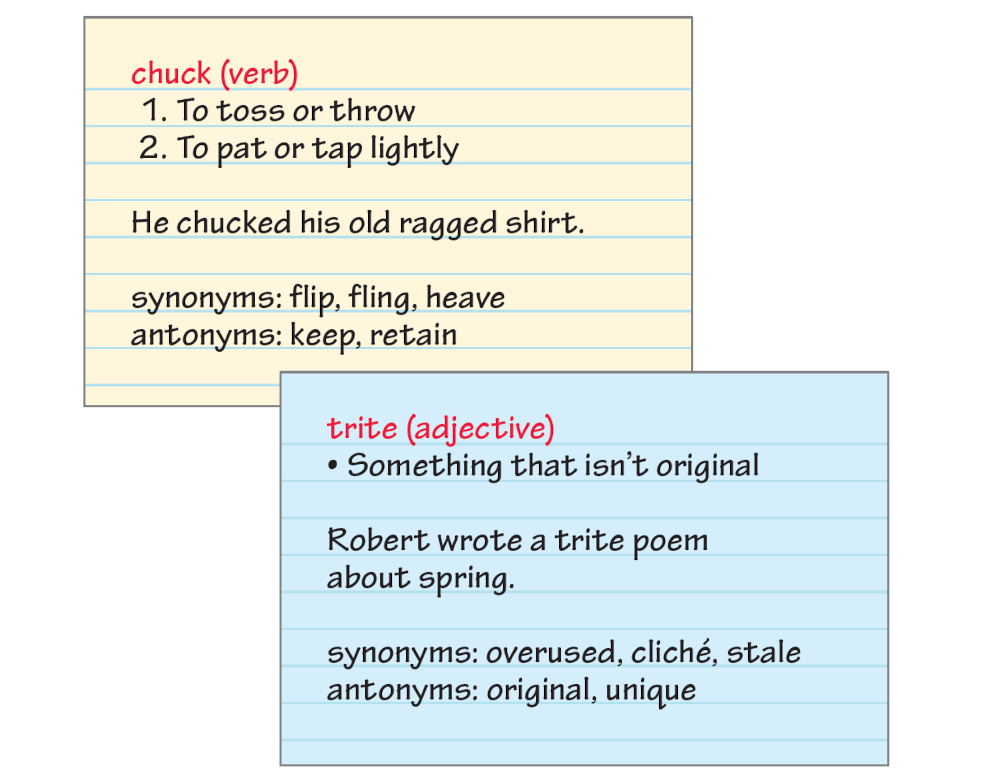
WE 347
Page 347
5. Learn about word parts.
You can figure out the meanings of new words by learning about the three basic word parts:
- prefixes (word beginnings),
- suffixes (word endings), and
- roots (word bases).
Learn the meanings of some of the most common prefixes, suffixes, and roots.
- The prefix sub means “under.”
- The root terra means “earth.”
Look for those word parts whenever you meet a new word.
The story is about a subterranean city.(If you know that sub means “under” and terra means “earth,” you can figure out that subterranean means “under the earth.”)
6. Watch for word families.
Word families are groups of words that are built from the same basic word. If you know the meaning of the basic word, you can often figure out the meanings of other words in the same family. The basic word astro or aster means “star.” Can you use that knowledge to figure out the meaning of any of the following words?

Tip On pages 348 357, you will find a list of the most common prefixes, suffixes, and roots in the English language. Take some time to look them over. It can be both fun and educational.
WE 348
Page 348
Prefixes
Prefixes are word parts that come before the root or word base (pre = before). Prefixes can change the meaning of a word.
ambi, amphi [both]
ambidextrous (skilled with both hands)
amphibious (living on both land and water)
anti [against]
antifreeze (a liquid that works against freezing)
antipollutant (designed to work against pollution)
astro [star]
astronaut (star or space traveler)
astronomy (study of the stars)
auto [self]
autobiography (writing about yourself)
autonomy (self-government)
bi, bin [two]
binocular (using both eyes)
biweekly (every two weeks)
circum [around]
circumference (the line that goes around a circle)
circumnavigate (to travel completely around)
co [together, with]
coauthor (one who writes with at least one other person)
copilot (one who flies with and assists the main pilot)
ex [out]
exit (the act of going out)
expel (drive out)
hemi, semi [half]
hemisphere (half of a sphere)
semicircle (half of a circle)
hyper [over]
hyperactive (overly active)
hypersensitive (overly sensitive)
inter [among, between]
intermission (a pause between the acts of a play)
international (of or between two or more nations)
macro [large]
macroclimate (general climate of a large area)
macrocosm (the entire world)
mal [badly, poorly]
maladjusted (poorly adjusted)
malnutrition (poor nutrition)
mono [one]
monochrome (one color)
monorail (one-rail train)
non [absence of, not]
nonfat (absence of fat)
nonfiction (not fiction)
oct [eight]
octagon (a shape with eight sides)
octopus (a sea animal having eight armlike tentacles)
WE 349
Page 349
penta [five]
pentagon (a figure or building having five angles and sides)
pentameter (a line of verse composed of five metrical feet)
poly [many]
polychrome (many colors)
polygon (a figure having many angles or sides)
post [after]
postscript (a note added at the end of a letter)
postwar (after a war)
pre [before]
premature (happening before the proper time)
preview (showing something before the regular showing)
pseudo [false]
pseudonym (false name)
pseudopod (false foot)
quad [four]
quadrant (one quarter of a circle)
quadruple (four times as much)
quint [five]
quintet (group of five musicians)
quintuplet (one of five children born in a single birth)
re [again, back]
return (to come back)
rewrite (to write over again)
sub [under]
submerge (put under)
subsoil (layer under the topsoil)
trans [across, beyond]
transoceanic (crossing the ocean)
transplant (to move something)
tri [three]
triangle (a figure that has three sides and three angles)
tricycle (a three-wheeled vehicle)
un [not]
uncomfortable (not comfortable)
unhappy (not happy)
uni [one]
unicycle (a one-wheeled vehicle)
unique (one of a kind)
Numerical Prefixes
|
Prefix |
Symbol |
Equivalent |
Prefix |
Symbol |
Equivalent |
|
|
deca |
da |
tenfold |
deci |
d |
tenth part |
|
|
hecto |
h |
hundredfold |
centi |
c |
hundredth part |
|
|
kilo |
k |
thousandfold |
milli |
m |
thousandth part |
|
|
mega |
M |
millionfold |
micro |
u |
millionth part |
|
|
giga |
G |
billionfold |
nano |
n |
billionth part |
|
|
tera |
T |
trillionfold |
pico |
p |
trillionth part |
WE 350
Page 350
Suffixes
Suffixes are word parts that come at the end of a word. Sometimes a suffix will tell you what part of speech a word is. For example, many adverbs end in the suffix ly.
able [able, can do]
agreeable (willing to agree)
capable (able to do something)
ed [past tense]
called (past tense of call)
learned (past tense of learn)
er [one who]
baker (one who bakes)
teacher (one who teaches)
er [used to compare things]
neater (more neat than another)
tougher (more tough than another)
ess [female]
lioness (a female lion)
princess (female royalty)
est [used to show superiority]
fastest (most able to move fast)
hottest (highest temperatures)
ful [full of]
careful (full of care)
helpful (full of help)
ing [an action or process]
talking (to talk)
writing (to write)
ist [one who]
artist (one who creates art)
chemist (one who specializes in chemistry)
less [without]
careless (without care)
hopeless (without hope)
ly [in some manner]
bashfully (in a bashful manner)
quickly (in a quick manner)
ment [act of, result]
achievement (result of achieving)
movement (act of moving)
ness [state of]
carelessness (state of being careless)
restlessness (state of being restless)
ology [study, science]
biology (study of living things)
geology (study of the earth, rocks)
s [plural, more than one]
books (more than one book)
trees (more than one tree)
sion, tion [state of]
action (state of doing something)
infection (state of being infected)
y [inclined to]
cheery (inclined to be cheerful)
itchy (inclined to itch)
WE 351
Page 351
Roots
A root is the main part of a word. If you know the root of a difficult word, you can most likely figure out the word’s meaning. This can be very useful when learning new words in all your classes.
acid, acri [bitter, sour]
acrid (bitter taste or odor)
antacid (works against acid)
act, ag [do, move]
action (something that is done)
agent (someone who acts for another)
ali, alter [other]
alias (a person’s other name)
alternative (another choice)
am, amor [love, liking]
amiable (friendly)
amorous (loving)
anni, annu, enni [year]
anniversary (happening at the same time every year)
annually (yearly)
centennial (every 100 years)
anthrop [man]
anthropoid (humanlike)
anthropology (study of human beings)
aster [star]
aster (star flower)
asterisk (starlike symbol)
aud [hear, listen]
audible (can be heard)
auditorium (a place to listen)
bibl [book]
Bible (sacred book of Christianity)
bibliography (list of books)
bio [life]
biography (writing about a person’s life)
biology (study of life)

centri [center]
centrifugal (moving away from the center)
concentric (having a common center)
chrom [color]
chromatics (scientific study of color)
monochrome (one color)
WE 352
Page 352
chron [time]
chronological (in order of time)
synchronize (together in time)
cide [kill]
genocide (race killer)
homicide (human killer)
cise [cut]
incision (a thin, clean cut)
precise (cut exactly right)
cord, cor [heart]
cordial (heartfelt)
coronary (relating to the heart)
corp [body]
corporation (a legal body)
corpulent (having a large body)
cosm [universe, world]
cosmos (the universe)
microcosm (a small world)
cred [believe]
incredible (unbelievable)
cycl, cyclo [wheel, circular]
bicycle (a cycle with two wheels)
cyclone (a circular wind)
dem [people]
democracy (people rule)
epidemic (on or among the people)
dent, dont [tooth]
denture (false teeth)
orthodontist (someone who straightens teeth)
derm [skin]
dermatology (the study of skin)
epidermis (outer layer of skin)
dic, dict [say, speak]
dictionary (a book of words people use or say)
predict (to tell about something in advance)
dynam [power]
dynamite (powerful explosive)
dynamo (power producer)
equi [equal]
equilibrium (a state of balance; equally divided)
equinox (day and night of equal length)
fac, fact [do, make]
factory (a place where people make things)
manufacture (to make by hand)
fer [bear, carry]
conifer (a cone-bearing tree)
ferry (carry from place to place)
fide [faith, trust]
confident (trusting oneself)
fidelity (faithfulness to a person or cause)
fin [end]
final (the last or end of something)
infinite (having no end)
flex [bend]
flexible (able to bend)
reflex (bending or springing back)
flu [flowing]
fluid (flowing, waterlike substance)
influence (to flow in)
WE 353
Page 353
forc, fort [strong]
force (strength or power)
fortify (to make strong)
fract, frag [break]
fracture (break)
fragment (a piece broken from the whole)
gastr [stomach]
gastric (relating to the stomach)
gastritis (inflammation of the stomach)
gen [birth, produce]
congenital (existing at birth)
genetics (study of inborn traits)
geo [earth]
geography (study of the earth)
geometry (measuring the earth)
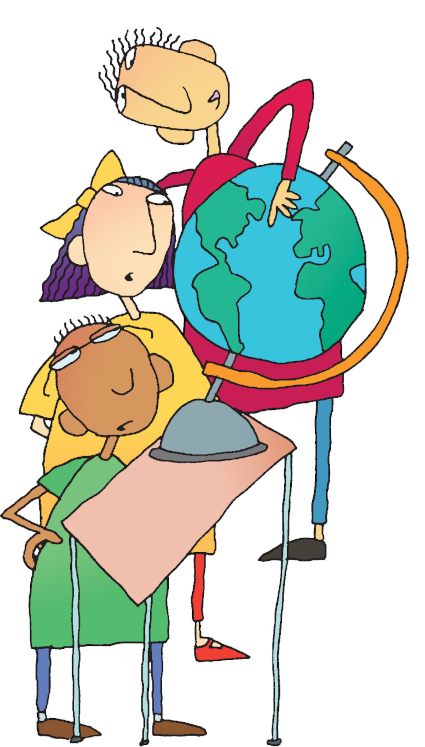
grad [step, go]
gradual (step-by-step)
graduation (taking the next step)
graph [write]
autograph (self-writing)
photograph (light-writing)
greg [group, herd]
congregation (a group that is functioning together)
segregate (tending to group apart)
hab, habit [live]
habitat (the place in which one lives)
inhabit (to live in)
hetero [different]
heterogeneous (different in birth or kind)
heterosexual (with interest in the opposite sex)
homo [same]
homogeneous (of same birth or kind)
homogenize (to blend into a uniform mixture)
hum [earth]
exhume (to take out of the earth)
humus (earth; dirt)
hydr [water]
dehydrate (take water out of)
hydrophobia (fear of water)
ject [throw]
eject (to throw out)
project (throw forward)
WE 354
Page 354
leg [law]
legal (related to the law)
legislature (persons who make laws)
log, ology [word, study]
psychology (mind study)
zoology (animal study)
luc, lum [light]
lumen (a unit of light)
translucent (letting light come through)
magn [great]
magnificent (great)
magnify (increase to a greater size)
man [hand]
manicure (to fix the hands)
manufacture (to make by hand)
mania [madness]
kleptomania (an abnormal tendency to steal)
maniac (a mad person)
mar [sea, pool]
marine (related to the sea)
marsh (a wet, grassy area)
medi [middle, between]
Mediterranean (lying between lands)
medium (in the middle)
mega [great]
megalopolis (great city or an urban region)
megaphone (great sound)
mem [remember]
memo (a note; a reminder)
memorial (a remembrance)
meter [measure]
meter (a unit of measure)
voltmeter (instrument to measure volts)
migra [wander]
emigrant (one who leaves a country)
migrant (someone who wanders from place to place)
mit, miss [send]
emit (send out; give off)
missile (an object sent flying)
mob, mot [move]
mobile (capable of moving)
promotion (to move forward)
mon [warn, remind]
admonish (warn)
monument (a reminder of a person or an event)
morph [form]
amorphous (with no form or shape)
metamorphosis (change of form)
mort [death]
immortal (something that never dies)
mortuary (a place for the dead)
multi [many, much]
multicultural (including many cultures)
multiped (an organism with many feet)
nat [to be born]
innate (inborn)
nativity (birth)
WE 355
Page 355
neur [nerve]
neuritis (inflammation of a nerve)
neurologist (a physician who treats the nervous system)
nov [new]
innovation (something newly introduced)
renovate (to make like new again)
numer [number]
enumerate (to find out the number)
innumerable (too many to count)
omni [all, every]
omnipresent (present everywhere)
omnivorous (all-eating)
onym [name]
anonymous (without a name)
pseudonym (false name)
ortho [straight]
orthodontist (someone who straightens teeth)
orthodox (straight or usual belief)
pac [peace]
Pacific Ocean (peaceful ocean)
pacify (make peace)
path, pathy [feeling, suffering]
empathy (feeling with another)
telepathy (feeling from a distance)
patr [father]
patriarch (the father of a family)
patron (special guardian or father figure)
ped [foot]
pedal (lever for a foot)
pedestrian (a traveler by foot)
pend [hang, weigh]
pendant (a hanging object)
pendulum (a weight hung by a cord)
phil [love]
Philadelphia (city of brotherly love)
philosophy (love or study of wisdom)
phobia [fear]
acrophobia (fear of high places)
agoraphobia (fear of public, open places)
phon [sound]
phonics (related to sounds)
symphony (sounds made together)
photo [light]
photograph (light-writing)
photosynthesis (action of light on chlorophyll)
pop [people]
population (the number of people in an area)
populous (full of people)
port [carry]
export (carry out)
portable (able to be carried)
proto [first]
protagonist (the first or leading character)
prototype (the first model made)
psych [mind, soul]
psychiatry (healing of the mind)
psychology (study of the mind)
WE 356
Page 356
rupt [break]
interrupt (break into)
rupture (break)
sci [know]
conscious (knowing or being aware of things)
omniscient (knowing everything)
scope [see, watch]
kaleidoscope (instrument for viewing beautiful forms)
microscope (instrument for seeing tiny objects)
scrib, script [write]
manuscript (written by hand)
scribble (write quickly)
sen [old]
senile (the weakness of old age)
senior (an older person)
sequ, secu [follow]
consecutive (following in order, one after another)
sequence (one thing following another)
spec [look]
inspect (look at carefully)
specimen (an example to look at)
sphere [ball, orb]
hemisphere (half of a sphere)
stratosphere (the upper portion of a sphere)
spir [breath]
expire (breathe out; die)
inspire (breathe into; give life to)
strict [draw tight]
constrict (draw tightly together)
tact, tag [touch]
contact (touch)
contagious (transmission of disease by touching)
tele [far]
telephone (far sound)
telescope (far look)

tempo [time]
contemporary (those who live at the same time)
tempo (rate of speed)
tend, tens [stretch, strain]
extend (to make longer)
tension (tightness caused by stretching)
terra [earth]
terrain (visible earth or ground)
terrestrial (relating to the earth)
therm [heat]
thermal (related to heat)
thermostat (a device for controlling heat)
tom [cut]
anatomy (cutting apart a plant or animal to study it)
atom (cannot be cut or divided)
WE 357
Page 357
tox [poison]
intoxicated (poisoned inside)
toxic (poisonous)
tract [draw, pull]
traction (the act of pulling or gripping)
tractor (a machine for pulling)
trib [pay]
contribute (give money to)
tribute (pay honor to)
turbo [disturb]
turbulent (violently disturbed)
turmoil (very disturbed condition)
typ [print]
prototype (first print)
typo (a printing error)
vac [empty]
vacant (empty)
vacuum (a space empty or devoid of matter)
val [strength, worth]
equivalent (of equal worth)
evaluate (find out the worth)
vert, vers [turn]
divert (turn aside)
reverse (turn back)
vid, vis [see]
supervise (oversee or watch over)
video (what we see)
viv [alive, life]
revive (bring back to life)
vivacious (full of life)
voc [call]
vocal (calling with your voice)
vocation (a calling)
vor [eat greedily]
carnivorous (flesh-eating)
herbivorous (plant-eating)
zo [animal]
zodiac (circle of animals; the constellations)
zoology (study of animal life)
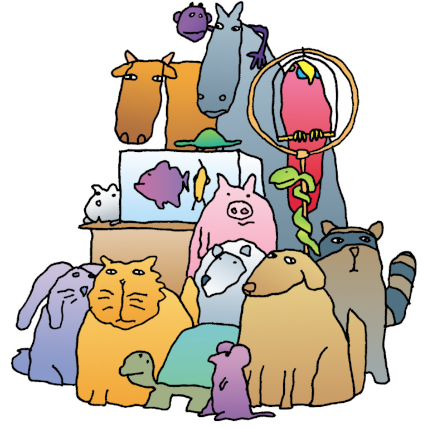
WE 358
Page 358
Using Vocabulary Words Correctly
When you learn new vocabulary words, it’s important to use them correctly. There are formal and informal ways to use words.
Formal Language
You use formal language when you write informational essays, research papers, and serious emails. Here are some tips (and a sample) to help you use words in a formal way:
- Pay careful attention to the words you choose.
- Follow the rules of grammar.
- Use a serious tone.
Large cows line the streets of downtown Chicago. Each cow is actually a work of art decorated in a clever or artistic way. The cows will be auctioned to buyers around the country. The money will benefit local charities.
Informal Language
You use informal language when you write friendly emails, personal narratives, character sketches, and personal blogs. Here are some guidelines and a sample:
- Use everyday language.
- Follow the basic rules of grammar.
- Write with a friendly tone.
Cows have invaded downtown Chicago. But these are fake cows that are decorated from head to hoof. They’ll soon be auctioned off for charity. Who knows, one may show up on your front lawn!